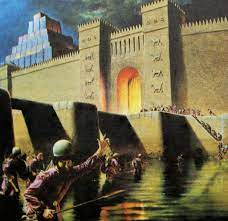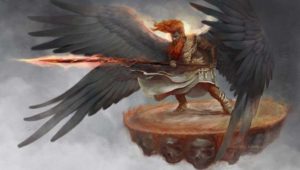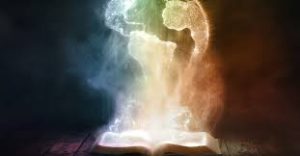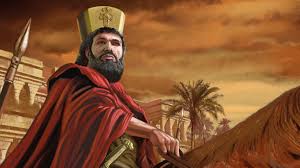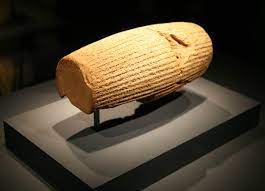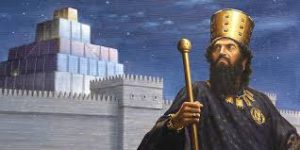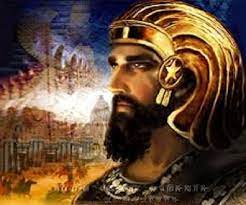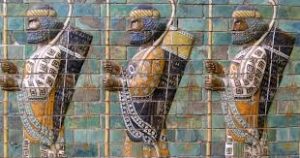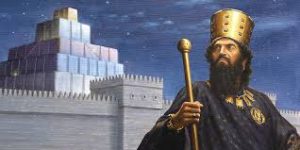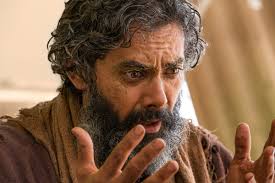Ij – I Foretold the Former Things Long Ago, I Announced Them 48: 1-11
I Foretold the Former Things Long Ago,
I Announced Them and Made Them Known
48: 1-11
I foretold the former things long ago, I announced them and made them known DIG: For what does the prophet rebuke the nation? How might this attitude account for the LORD’s ridicule of idolatry in Chapters 40-48? Why has God gone to such lengths to announce this deliverance ahead of time? Why does ADONAI bother to save Isra’el (see 48:8; 45:14)? If He had cut her off, what would the nations assume about Ha’Shem compared to the gods of Babylon?
REFLECT: The Jews, both before and during the captivity, never gave up worship of YHVH, but many added idolatrous practices to their Judaism. Where do you feel caught between relying on biblical doctrines yet living by the values of modern idols? How might God be getting the message across to you that you can’t have it both ways? Have you ever been influenced by the rebellious attitude of other believers? How has your rebellion at times affected others? What has it cost you in terms of ADONAI’s peace and blessing in your life? Does it really matter whether we try to obey God? How so? What do these verses have to say about the grace of our LORD? If you had a choice, would you want God to be fair to you, or gracious? Why?
God’s strongest case against idolatry in Chapters 40 through 47 has been the fulfillment of prophecy. In this section God is going to turn to Isra’el, about 200 years later and say, “Look at My prophecies concerning the coming of Cyrus and the deliverance from Babylon. Were they not fulfilled exactly the way I prophesied?”
The central question of Chapters 7 to 39 was: Will you trust God? That question was asked in the context of the Assyrian threat. And here, although the threat is not the same, Isaiah shows that the issue has not changed. The same house of Jacob that doubted that they could trust ADONAI to deliver them from the Assyrians would also doubt that they could trust the LORD to deliver them from the Babylonians.
To be sure, the appeal in Chapters 40 to 47 has moved a step farther. In the earlier chapters concerning the Assyrians, the message was: If you do not trust God, destruction will come on you. Now, concerning the Babylonians, the message is: Trust God because He has unconditionally pardoned you and will break the power of those who hold you. In the same way the proofs of God’s ability to help Isra’el (and us) have also advanced. With the Assyrians, it was the inability of any other nation to help Isra’el. Here with the Babylonians, it is the LORD’s ability as Creator to master history, and the evidence of fulfilled prophecy. But the issue is the same with Isaiah. Will we respond in trust? God’s trustworthiness has been demonstrated in Chapters 7 to 39, and His grace has been offered in Chapters 40 to 48, but it is all for nothing unless we humans act on it. Trust demands surrender to our proud independence and does not come naturally to us.182

Isaiah starts out this chapter with a rebuke and reminds the Israelites of their hypocrisy. Listen to this, O house of Jacob, you who are called by the name of Israel and come from the line, or waters, of Judah, you who take oaths in the name of the LORD and invoke the God of Isra’el (48:1a). What is the point of piling up all these names? It sets the stage for what follows. There is an appeal to the past: Jacob, meaning Isra’el and Judah. Who were they? They existed because of what ADONAI had done to and with their ancestors. But it was a proud claim without reality. They swear by the name of Ha’Shem and claim to trust in Him, but in reality their claim is hypocritical.
But not in truth of righteousness though you who call yourselves citizens of the holy city and rely on the God of Isra’el (481b-2) – the LORD of heaven’s angelic armies is His name (48:2). They took oaths, invoking God’s name, but they were not righteous. They thought that being citizens of Jerusalem, though they were not living there, was enough. But they were actually citizens of the holy city in name only. In reality, they were strangers to God. They thought that claiming to rely on ADONAI, even though they were not, was enough. Because many had become comfortable over the course of the seventy years of captivity, many considered it unimportant to go back to live in Judah. In that regard they had failed, nevertheless, God’s plans were not frustrated. How could Isra’el realize all the potential that her grand heritage and proud faith had to offer? By squarely facing the contradiction between her words and her actions. She needed to pay careful attention to what God had done for her in the past and learn from it.
From the beginning of Isaiah 1:2 to the end in 66:24, God, through His prophet Isaiah, addresses rebellion. And when you think about it, the Bible says that we were created to live within certain limits and our refusal to “stay within the lines,” sooner or later, results in disaster. Spiritual anarchy as a life plan never works.
Our refusal to follow the LORD’s commands is not just an ignorant missing of the mark, it is an intentional and deliberate rebellion against what we know we should do. At its deepest level, it is a rejection of a relationship of dependence upon God, a refusal to acknowledge that He has the right to declare what is right and wrong for us. This is a part of the significance of the book of Deuteronomy, which places the entire element of obedience and dependence upon God in the midst of our relationship with Him. What the Jews did when they rebelled against God was not merely disobedience, but treachery (48:8), or a breaking of faith. So in the end rebellion, stubbornness, and treachery are what sin is all about. It is entirely appropriate that Messiah should have been betrayed by one of His own disciples, because that is what God’s family has been doing to Him since the dawn of time. We have not accidentally fallen into a ditch. Instead, like the two-year old who has been told not to ride his big-wheel down the driveway into the street, and who looks to make sure that he is not being watched before he starts, we have consciously and willfully chosen to fall into the ditch.183
The first part of the argument had to do with what the LORD had done for the Israelites in the past (48:3-6a). Throughout this section God made the case of the former prophets. I foretold the former things long ago, My mouth announced them and I made them known; then suddenly I acted, and they came to pass (48:3). It was He who inspired them, and now the prophecies had come to pass. Suddenly implies that the fulfillment of the prophecy was not always in the time or place expected (see 5:19, 46:10 and 48:14), but according to His sovereign will. ADONAI declared Himself to be both the declarer and the doer of prophecy. In other words, YHVH not only predicts, but being the sovereign God, He also brings about the fulfillment of His own prophecy. The fact that He can predict comes from His omniscience, and the fact that He can bring it to pass comes from His omnipotence. This is the sovereign God who was speaking to the Israelites.
Then He gives us two reasons why ADONAI fulfilled these prophecies quickly and suddenly. The first reason was because they were stubborn. For I know how stubborn you were; the sinews of your neck were iron, your forehead was bronze (48:4). The image Isaiah uses here is that of a stubborn animal that digs its heels, stiffens its neck and refuses to be led in the way it does not want to go. Over and over again Moses accused Isra’el of being stubborn (Ex 32:9; 33:3 and 5; 34:9; Deut 9:6 and 13, 27; 10:16; 31:27) because he experienced it over the forty years of wilderness wanderings. And in Deuteronomy 31:27 he realized that even after his death, Isra’el will continue to be stubborn. In fact, according to Dani’el 12:5-7, one of the main purposes of the Great Tribulation is to break the stubbornness of the Jewish nation so that they will come to know God. But here, He fulfilled prophecies suddenly so that Isra’el’s stubborn ways would be revealed and she might see that her precious idols had failed her. God alone made those prophecies come true.
God did not choose Jacob and his sons because they were superior, nor did He choose us because we are superior. The LORD chose Jacob and us because of His grace and because He saw our great need. Also, God must deliver His people so the world may know the Truth. Jesus said: You are right in saying I am a King. In fact, for this reason I was born, and for this I came into the world, to testify to the truth. Everyone on the side of truth listens to Me (John 18:37).
The second reason was to make sure that the idols do not get the credit, because Isra’el was prone to give it to them. Therefore, I told you these things long ago; before they happened I announced them to you so that you could not say, “My idols did them, my wooden image and metal god ordained them” (48:5). It was not Bel or Nebo (46:1) who caused the fall of Jerusalem and the exile to Babylon, it was ADONAI. Neither would they free the exiles to go home. Nor was it some creation of human intellect or cunning that announced those events to happen; it was the living God.
Before proceeding to the next stage of his argument, Isaiah sums up what he had just said: You have heard these things; look at them all. Will you not admit them (48:6a)? Isra’el did not hear the prophecy before, but now they are hearing it. And now they are obligated to proclaim that the idols failed where God succeeded. She could no longer refuse to allow the facts to persuade her. For far too long, it was as if Isra’el had said, “My mind is already made up, don’t confuse me with the facts!” That would have to end.
Next, we see the case for new prophecies (48:6b-8). From now on I will tell you of new things, of hidden things unknown you (48:6b). Isra’el had ignored the previous prophecies, so God now announces the coming of new prophecies. Having heard the predictions and witnessed their fulfillment, the people can no longer doubt that the LORD alone plans and rules the destinations of nations. They must, therefore, also believe in the new prophecies now made by His prophet. Once again, the test of a prophet was this, after successfully prophesying near events, the prophet could be trusted with success in prophesying far events. The easiest thing to do is to predict the events of a thousand years in advance because they would not be around to suffer the consequences if their prophecies were not fulfilled. It is quite another thing for a prophet to prophesy something six months to a year in advance because if the prophecy did not come true he would be stoned to death. But God here subjects Himself to the test of a prophet. He reminds them of the former prophecies that had come to pass. So now He says that since these earlier prophecies had come to pass, they could trust Him for the far prophecies. Therefore, there is an announcement of new prophecies to come.
God gives two reasons why He will predict new prophecies. They are created now, and not long ago; you have not heard of them before today. Therefore, you cannot say, “Yes, I knew of them” (48:7). The refusal to believe in revealed truth was the cardinal sin of God’s people (Amos 2:4). The LORD’s prophecies were created now, not that God had never thought of them before, but that they would be put into effect now. From Deuteronomy 30:1-5, Isra’el knew she would be brought back to the Land after captivity. After all, her living in the Land was guaranteed by the Abrahamic Covenant (see the commentary on Genesis, to see link click Eg – I Am the LORD, Who Brought You Out of Ur of the Chaldeans to Give You This Land). But until Isaiah’s prophecies were given, she did not know how God would deliver her. This was so the Israelites would not feel smug, thinking their own cunning had liberated them. They were actually spiritually insensitive.
The second reason was because of Israel’s treachery in giving credit to idols. You have neither heard nor understood; from of old your ear has not been open (48:8a). Again, the point is made that these prophecies had never been made before. Why not? Would it have been just another opportunity for unfaithfulness? But if that were true, why give them any more prophecies at all? The reason is simple: so that it will be obvious that it was the LORD at work and not the idols.
From the very beginning Isra’el was prone to idolatry. We saw this right after the exodus when she made a golden calf while Moses was up on Mount Sinai. And throughout Isra’el’s history up to Isaiah’s day, Isra’el was prone to idolatry and to spiritual adultery. Well do I know how treacherous you are; you were called a rebel from birth (48:8b). This was her treachery. God performed miracles for Isra’el, and whom did she thank? She thanked idols for performing the blessings that God alone had given her. ADONAI wanted to make sure she understood that her physical and spiritual deliverance would not come from her own goodness or planning, but from His grace.
In view of God’s firsthand understanding of Isra’el’s stubborn tendencies to idolatry (48:5) and rebellion (48:8), why had He not abandoned them (48:9-11)? He could have. He had the right to. Her sin was great enough for total destruction. So why was He going to do those new things to make her deliverance possible? Isaiah answered with a theme that began in Exodus 34 and reached its inevitable conclusion in Ezeki’el 37.
When ADONAI entered into a covenant with the people of Isra’el, His name, His reputation, became forever linked with them. For My own name’s sake, I delay My wrath; for the sake of My praise I hold it back from you, so as not to cut you off (48:9). Moses presented the argument to the LORD when God asked why He should not destroy Israel after the golden calf incident (see the commentary on Exodus Gs – Now Leave Me Alone So That My Anger May Burn Against Your People). The question was not one of legality or justice, but, more accurately, what the Gentile nations would think of ADONAI if He would abandon or destroy her. Consequently, the real question was not whether God was just, but whether He would be gracious to her. Will the nations observing God’s justice accuse Him of being fickle like all the other gods? Or would they see the One who was unlike any they had ever seen because of His incredible patience and mercy? He didn’t want to destroy Jacob, but He did hope to bring her to her senses as she experienced the fruit of her rebellion.
See, I have refined you, though not as silver; I have tested you in the furnace of affliction (48:10). The purpose of the exile was to refine her so she would return to the Land in faith. The captivity was like a furnace, to test her, not to destroy her.
The story is told of a group of women that met for Bible study. While studying in the book of Malachi, they came across verse three which says: He will sit as a refiner and purifier of silver (Malachi 3:3a). This verse puzzled the women and they wondered how this statement applied to the character and nature of God. One of the women offered to find out more about the process of refining silver, and to get back to the group at their next Bible study. The following week, the woman called up a silversmith and made an appointment to watch him while at work. She didn’t mention anything about the reason for her interest, beyond her curiosity about the process of refining silver. As she watched the silversmith work, he held a piece of silver over the fire and let it heat up. He explained that in refining silver, one needed to hold it in the middle of the fire, where the flames were the hottest as to burn away all the impurities. The woman thought about God holding us in such a hot spot, then she thought again about the verse, that He sits as a refiner and purifier of silver. She asked the silversmith if it was true that he had to sit there in front of the fire the entire time the silver was being refined. The man answered yes, that not only did he have to sit there holding the silver, but he also had to keep his eyes on it the entire time it was in the fire. If the silver was left even a moment too long in the flames, it would be destroyed. The woman was silent for a moment. Then she asked the silversmith, “But how do you know when the silver is fully refined?” He smiled at her and answered, “Oh, that’s easy . . . when I see my image in it.”
If ADONAI would go back on His word about her return, His reputation would be defamed. So, He declared: For My own sake, for My own sake, I do this. How can I let Myself, I do this? How can I let Myself be defamed? I will not yield My glory to another (48:11). There are three reasons why God did not totally destroy Isra’el.
First, for God’s own name’s sake and for the sake of His praise. God has a covenant relationship with Isra’el and therefore is a covenant keeper, part of which marks the eternity of Jewish existence. If the Jews cease to exist, it would reflect badly on God.
Secondly, for Isra’el’s refinement. There is a time coming in which Isra’el will be tested in the furnace of affliction. In Ezeki’el 20:34-38 it is clear this furnace of affliction is the Great Tribulation. Therefore, although God judged Isra’el partially, ultimately, they will be totally refined.
Thirdly, so that Gentile nations could not claim it was their idols or gods who cut Isra’el off forever. If Isra’el were to be cut off, the Gentiles would not give glory to God, but to their idols and idolatry. The LORD would not allow that to happen. He would demonstrate His covenant relationship with them, by delivering His people against all odds, whether political or spiritual. Similarly, ADONAI declared at Mount Sinai: But I dreaded the taunt of the enemy, lest the adversary misunderstand and say, “Our hand has triumphed; the LORD has not done all this” (Deuteronomy 32:27). On the people’s part, they needed to make up their minds once-and-for-all to give Him their absolute loyalty. Is the same not true for us today?




